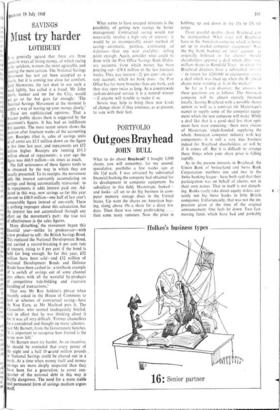Must try harder
SAVINGS LOTHBURY
It is generally agreed that there are three standard ways of losing money, of which racing - the quickest, women the most agreeable, and farming the most certain. The National Savings jovement has not yet been accepted as a fourth, but it is coming too close for comfort. Lord Shawcross, the last man to use such a word lightly, has called it a fraud. Mr John Smith, banker and MP for the City, would ot go so far but goes far enough: The National Savings Movement at the moment is simply a way of tearing up your money slowly.' These are sophisticated opinions. That a broader public shares them is suggested by the movement's figures. It has had an indifferent first quarter. The most recent return shows the position after fourteen weeks of the accounting year. Receipts (that is, sales of savings units of all sorts) are £5.5 million down on the figure at this time last year, and repayments are £52 million higher. Receipts are running £11.3 million ahead of repayments: a year ago the figure was £68.9 million—six times as much. The full seriousness of these figures tends to be obscured by the way in which they are
usually presented. To its receipts. the movement
adds the interest constantly accumulating on savings and being automatically reinvested : to its repayments it adds interest paid out. Ad- justed in this way, new savings so far this year amount to £48.9 million—one half of last year's comparable figure instead of one-sixth. There is nothing improper about this calculation, but the interest has not accumulated through any effort on the movement's part: the true test of effectiveness is the sales figures. More disturbing,' the movement began this financial year—unlike its predecessor—with anew product to sell: the British Savings Bond. This replaced the National Development Bond, and carried a record-breaking 6 per cent rate of interest, rising to 8 per cent if the bond is held for long enough. So far this year, £32 million have been sold—and £32 million of National Development Bonds and Defence Bonds have,been cashed in: a textbook example of 'a switch of savings out of some channel into others with all the wasteful by-products of competitive rate-bidding and excessive handling.of transactions.' That was Mr Roy Jenkins's phrase when recently asked in the House of Commons to look at schemes of contractual saving—Save As You Earn, as Mr Macleod puts it. The Chancellor, who seemed inadequately briefed, said in effect that he was thinking about it but it was all very difficult. 'Former chancellors have considered and thought up many schemes, said Mr Barnett, from the Government benches. 'It is important to recognise how limited is the scope now left.' Mr Barnett must try harder. As an incentive, he should be reminded that every penny of the eight and a half tb,gsand million pounds in National Savings could be cleared out in a week. At a time when money itself and money savings are more deeply suspected than they have been for a generation, to cover one- quarter of the national debt in this way is highly dangerous. The need for a more stable and permanent form of savings medium argues What seems to have escaped ministers is the possibility of getting new savings by better management. Contractual saving would not necessarily involve a high rate of interest: it would be an incomparably easier method of saving—automatic, painless, continuing ad infininon—than any now available: selling point enough. Again, consider what could be done with the Post Office Savings Bank Ordin- ary accounts, from which money has been pouring out—£38.8 million in the last fourteen weeks. They pay interest-21 per cent—on cur- rent account, which no bank does: the Post Office has far more branches than any bank, and they stay open twice as long. As a countrywide cash-on-demand service it is a natural winner —if anyone will trouble to make it so. Savers may help to bring these new kinds of change about if they continue, as at present, to vote with their feet.






































 Previous page
Previous page